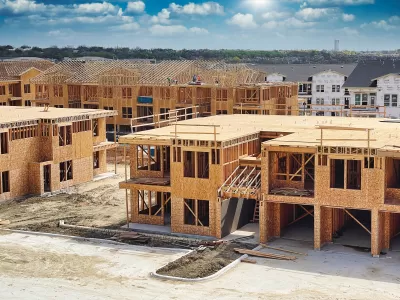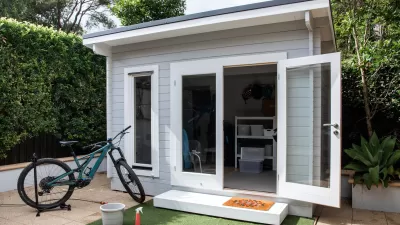Legislators in a state that so often touts its policies as the opposite of California’s defeated several bills that would have made housing construction easier, leading to concerns that a constricted housing market may exacerbate the housing crisis.

For decades, Texas land use and zoning policy has gone in a different direction than much of California, writes Duncan Hosie in an opinion piece for The Dallas Morning News. “Its land use and zoning regulations are less stringent. And affluent homeowners and bureaucrats have less power to block housing. As a result, more housing gets built every year in Texas than anywhere else, and far fewer people are rent burdened.”
But after the failure of several zoning-related bills to pass in the state legislature, Hosie charges Texas state legislators with being “all hat, no cattle” when it comes to their staunch opposition to ‘California-style’ policies, noting that NIMBY obstructionism and the unintended consequences of the California Environmental Quality Act (CEQA) have led to one of the nation’s worst housing crises.
The Texas bills in question would have permitted accessory dwelling units (ADUs), reduced minimum lot-size regulations, and “curbed so-called compatibility restrictions that limit the height of apartment buildings near single-family homes.” Hosie writes that “Disturbingly, many Democrats and Republicans in Texas trotted out the noxious NIMBY arguments that have reigned supreme in California to sink these proposals.”
According to Hosie, “while California offers a cautionary tale of bad housing policy, its growing YIMBY movement is charting a different course.” Texas legislators may want to look to this movement as a more effective model to “avoid the mistakes of its archrival.”
FULL STORY: Texas is going California on its housing policy

Planetizen Federal Action Tracker
A weekly monitor of how Trump’s orders and actions are impacting planners and planning in America.

Map: Where Senate Republicans Want to Sell Your Public Lands
For public land advocates, the Senate Republicans’ proposal to sell millions of acres of public land in the West is “the biggest fight of their careers.”

Restaurant Patios Were a Pandemic Win — Why Were They so Hard to Keep?
Social distancing requirements and changes in travel patterns prompted cities to pilot new uses for street and sidewalk space. Then it got complicated.

Platform Pilsner: Vancouver Transit Agency Releases... a Beer?
TransLink will receive a portion of every sale of the four-pack.

Toronto Weighs Cheaper Transit, Parking Hikes for Major Events
Special event rates would take effect during large festivals, sports games and concerts to ‘discourage driving, manage congestion and free up space for transit.”

Berlin to Consider Car-Free Zone Larger Than Manhattan
The area bound by the 22-mile Ringbahn would still allow 12 uses of a private automobile per year per person, and several other exemptions.
Urban Design for Planners 1: Software Tools
This six-course series explores essential urban design concepts using open source software and equips planners with the tools they need to participate fully in the urban design process.
Planning for Universal Design
Learn the tools for implementing Universal Design in planning regulations.
Heyer Gruel & Associates PA
JM Goldson LLC
Custer County Colorado
City of Camden Redevelopment Agency
City of Astoria
Transportation Research & Education Center (TREC) at Portland State University
Camden Redevelopment Agency
City of Claremont
Municipality of Princeton (NJ)





























